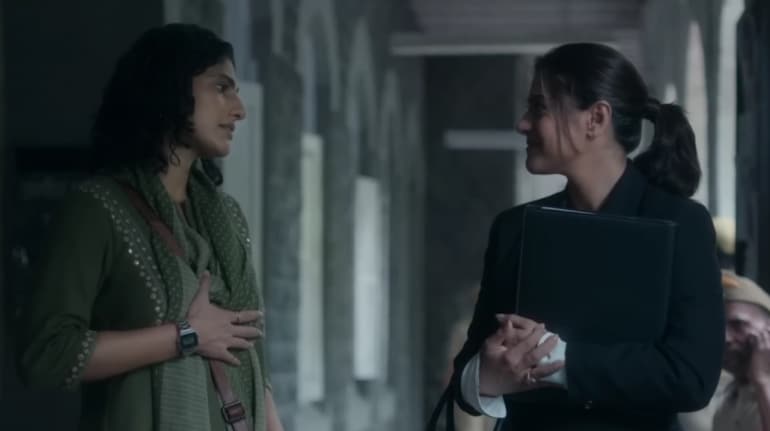



“Mohabbat sirf filmon mein achi lagti hai,” Noyonika, played by Kajol says to a colleague with whom she shares a romantic past in Disney+Hotstar’s The Trial. It’s a statement that befits the complex design of a show that asks us to believe in a woman’s practical doggedness as opposed to her loopy, convenient views about romance and servitude. So much so that it spells it out for us. After all, this is a show that centres a woman’s ambivalence about her own truth, as she helps unwrap several that surround her. Adapted from the successful show The Good Wife, The Trial installs Kajol as the anchor and somewhat complex subject of a series that though promising in design fails to take off. Not even Kajol’s star power, in a watered-down version here, can rescue bland performances, a languid script and canonical cases that quite simply fail to intrigue.
Directed by Suparn Verma, the series follows Noyonika Sengupta a mother of two, whose husband, a well-reputed judge, has been imprisoned for having allegedly offered favours in exchange for sexual gratification. There are of course layers to the indecency here, as a man betrays both the covenant of fairness within the justice system and that within his marriage. Noyonika, a former lawyer herself, must return to active practice to rescue both her home and the man she has to stand by, owing to design. It’s a lengthy ordeal that sets up a middle-aged woman for a second opportunity at coming of age. Only doing it as a mother who comes with the baggage of a radioactive husband, is easier said than done. Of course, there are roadblocks, twisty cases, toxic colleagues and a general culture of deranged suspicion that she must contend with in her journey towards redemption and clarity. There are friends, admirers and shoulders willing to somewhat foot the bill, as life throws at her costs of all sizes and scale.
On paper, it makes for an opportunity for a former starlet, to shed all that heroine gloss from '90s and embed herself into a character whose demands are far more sophisticated and concealed. Kajol, is somewhat up to the task but falters at accessing the complexity of Noyonika, a woman who must defend the indefensible but also manufacture a front that echoes moral righteousness. She confronts a toxic patriarch in office, questions her friend’s arm-twisting techniques and casually schools her husband in gender sensitivity, but for the most part, these interventions feel like empty disclaimers, delivered so stiffly they might as well have been written on the walls behind for us to read. “Kabhi Kabhi humare khwaab purey karne mein rishte adhure reh jaate hain,” the actress says, in a voiceover trying to exposition its way out of an inelastic performance. Contrary to her, Kubbra Sait, as a slippery, go-getter is far more convincing.
It’s surprising that for a show that features the likes of Sheeba Chaddha (Noyonika’s boss), and Jisshu Sengupta (as Noyonika’s husband), the acting feels lightweight, unsupported by material and writing that feels like it belongs in the '90s. Equally outdated is the background score, a moody devotional mix of forced pathos that contradicts the nutty and coarse territory the show is set in. At one point there is an argument between Noyonika, and her husband, who is speaking to her inside prison. He accuses her of warming up to a former flame to get ahead in her career. To this accusation, our protagonist responds, rather bluntly “Jab mard kare toh mehnat, aur jab aurat kare toh she must be sleeping around.” You get the sentiment, but not the puzzling dullness in which it is packaged. Sure, the pitch goes high, the eyes widen, but it scarcely evokes anything akin to emotion or perceptive rage. Which kind of underlines the larger problem with a series that feels incredibly leggy, underserved by its performers and criminally hung out to dry by unremarkable writing.
It’s hard to figure why Kajol, decent not too long ago in Lust Stories 2, feels puzzlingly out of place here. She seems lost in the body of a character that has lines to speak, but no significant inner anatomy to latch onto. She flitters between being woke and sacrificial, without changing expression, tenor or attitude. Often she feels like the same person confusedly parsing through a taciturn life without actually acknowledging how it feels to do so. That could have been a great character sketch in itself, had her dialogue not aspired to provincially flirt with poetry and philosophy – woke ideas that require a lot more spirit, and some greyness for that late discovery of clarity to seem like a moment at which we have arrived, as opposed to one we’ve been dragged to. Unfortunately, this adaptation feels more like the latter.
The Trial is now streaming on Disney+Hotstar
Discover the latest Business News, Sensex, and Nifty updates. Obtain Personal Finance insights, tax queries, and expert opinions on Moneycontrol or download the Moneycontrol App to stay updated!
Find the best of Al News in one place, specially curated for you every weekend.
Stay on top of the latest tech trends and biggest startup news.